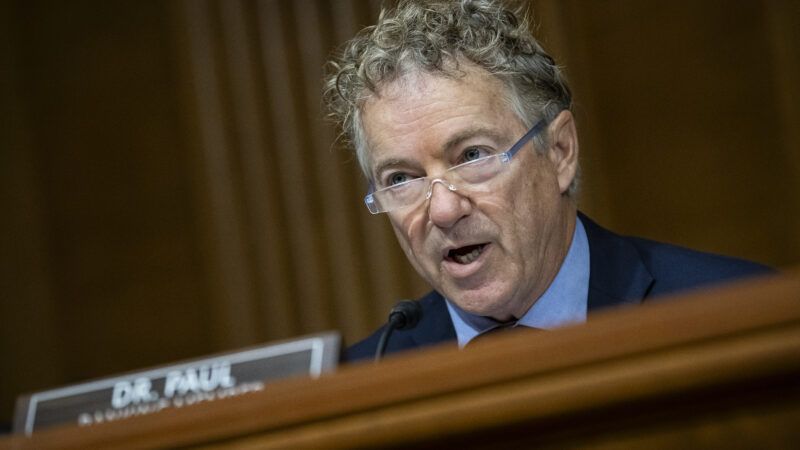Rand Paul's Bill Would Require NIH Scientists To Disclose Royalties They Receive From Drug Companies
The Royalty Transparency Act passed unanimously out of the Senate Homeland Security and Governmental Affairs Committee yesterday.

Over the past decade, scientists working at the National Institutes of Health (NIH) have earned an estimated $400 million in royalties from third-party companies for medical treatments and innovations they've helped produce. The NIH often provides grants to these same companies and produces research on their products. Despite that, the agency has resisted disclosing how much its scientists are getting paid and by whom.
A bill moving its way through Congress would change that.
On Wednesday, the Senate Homeland Security and Governmental Affairs Committee passed the Royalty Transparency Act of 2024 by a 12–0 vote.
The legislation would require that royalties received by federal government employees be included in their financial disclosures and that those disclosures be made available online for the general public to view.
"This is just basic 101 of conflict of interest. We're letting the billions of dollars that change hands over at NIH and between NIH and Big Pharma to be completely unscrutinized," says Sen. Rand Paul (R–Ky.), the author of the legislation. "This is probably the first reform bill that actually has a chance to correct some of the things that are rotten in the system."
The NIH's lack of transparency about the royalties paid to its scientists has been a source of controversy for decades.
A 2005 investigation by the Associated Press revealed that NIH scientists were receiving royalties for companies' pharmaceutical treatments that the agency was also studying in clinical trials.
That investigation prompted the NIH to require its employees to disclose these royalty payments to patients in clinical trials. But that information was still kept from the general public.
In 2021, watchdog group Open the Books filed public records requests (and when those were ignored, a lawsuit) seeking more information on royalties paid to NIH employees.
Initially, the NIH only released heavily redacted documents showing which employees had received royalties but not how much they were paid, who they were being paid by, or what they were being paid for.
In 2023, the NIH at last released new documents showing which companies were paying royalties to NIH scientists and more information on what the royalties were for. But the agency continues to redact how much individual scientists are earning from these royalties.
Paul's bill would require individual royalty amounts to be disclosed. The legislation would also require that members of federal advisory committees that make public health recommendations produce financial disclosures.
"With the approval of the COVID mandates and COVID vaccine mandates, the committees approving these, we had the question, well, are there people on these committees who get royalties from the companies that manufacture the vaccine?" Paul tells Reason. "When I asked [Anthony] Fauci about this a year ago, his angry response was that it was none of our business and that he didn't have to tell us."
Having passed out of committee, Paul's bill will now need the approval of the full Senate and then the House of Representatives.
Rent Free is a weekly newsletter from Christian Britschgi on urbanism and the fight for less regulation, more housing, more property rights, and more freedom in America's cities.


Show Comments (28)